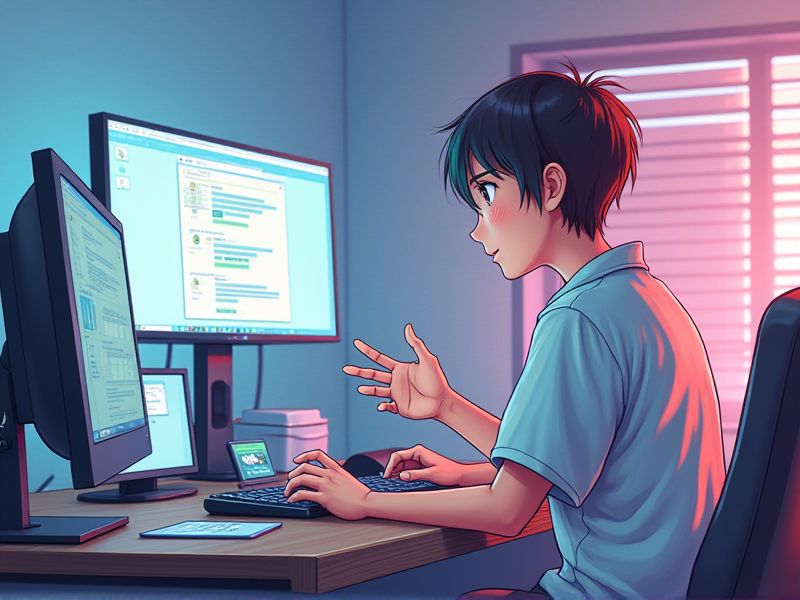
Improving at rhythm games requires a deep connection with the music, much like the concept of "eliminating the self" to reach the core of the music, as discussed in "The Inner Game of Music" . This mindset allows players to focus on the rhythm and timing without self-conscious interference. By immersing oneself in the rhythm, one can enhance their performance by trusting the silent rhythm that connects everyone, similar to how musicians connect with their audience . Practicing regularly and staying focused on the music's rhythm can help build skills and improve performance over time.
How to Be Better at Rhythm Games
Consistent practice
Consistent practice builds the muscle memory necessary for quick, precise input and better timing recognition in rhythm games. Regular repetition over concentrated sessions helps improve both accuracy and speed, leading to an overall enhancement in performance. Incrementally increasing the difficulty of practice routines adds challenge and solidifies skills faster, turning casual play into expert mastery. Monitoring your progress through data and scoring metrics enables you to quantify improvements and fine-tune your practice regimen over time.
Master timing and rhythm
Focus on rhythmic consistency by practicing with a metronome or the in-game beat to constantly refine timing. Regular practice hones muscle memory, making each beat feel more instinctive during gameplay. Analyzing your performance and adjusting to weak areas helps translate improved timing into higher scores. Balancing deliberate practice with relaxed play increases both precision and enjoyment in rhythmic challenges.
Optimize beat map analysis
Optimizing beat map analysis begins with actively breaking down the patterns and timing cues in each rhythm sequence. By rapidly identifying recurring beat structures and familiar sequences, you can reduce your reaction time and fine-tune your precision. Employing real-time adjustments based on immediate data feedback allows you to counteract latency and improve performance consistency. Reviewing historical gameplay metrics enables targeted adjustments to both strategy and settings, resulting in a more data-driven and effective approach to mastering rhythm games.
Develop muscle memory
Focus on repeating patterns and challenging sections consistently to strengthen your muscle memory. Regular practice reinforces neural pathways, enhancing coordination and reaction time during complex sequences. This repetition helps you anticipate and execute moves more naturally, reducing the cognitive load during gameplay. Over time, improved muscle memory leads to increased accuracy and fluidity, making rhythm games feel more intuitive.
Use a metronome for precision
Incorporating a metronome into your practice routine helps instill a sense of precise timing that's crucial for mastering rhythm games. Adjusting the metronome's tempo gradually aligns your reaction speed with various in-game beats, reinforcing your ability to keep time accurately. This steady, data-driven practice builds a stronger internal sense of rhythm, translating directly into improved gameplay precision. Consistent use of a metronome not only sharpens your timing but also cultivates a more reliable performance under pressure.
Warm up before sessions
Beginning your practice session with a warm-up routine activates muscle memory and primes your hand-eye coordination. Regular warm-ups help transition your brain into a focused state, reducing performance anxiety during intense gameplay. Engaging in quick drills before tackling tougher sections increases reaction speed and overall precision. This preparatory step not only improves your in-game performance but also builds consistency over time.
Incrementally increase difficulty
Incrementally increasing the difficulty of your rhythm game challenges forces you to adapt, enhancing both precision and timing. As you progress through tougher levels, you'll develop improved muscle memory and a keener sense of rhythm. Regularly stepping up the challenge not only builds skill but also increases your resilience to mistakes. This systematic approach helps pinpoint areas for improvement, providing clear data on your progress over time.
Record and review performance
Recording your gameplay allows you to pinpoint moments where timing slips or technique falters, offering a clear picture of your present skill level. Reviewing these recordings enables you to identify patterns in mistakes, which in turn makes your practice sessions more focused and effective. As you analyze the data from each session, you can adjust your strategies by targeting specific errors or reinforcing successful techniques. This methodical approach to self-review leads to more precise improvement, ensuring that each practice session builds incrementally on your fundamentals.
Engage with the community
Joining online forums and local meetups immediately connects you with experienced players who share data-driven strategies and detailed gameplay analyses. Regular interactions within these communities foster a feedback loop that converts qualitative tips into measurable improvements. By exchanging techniques and performance metrics, you gain insights into optimizing your timing and precision. Consistent engagement leads to a collaborative environment where shared data and personal experiences drive tangible progress in your rhythm game skills.
Maintain focus and mental stamina
Maintaining focus in rhythm games sharpens reaction times, which directly enhances performance by reducing mismatches between beats and actions. Strengthening mental stamina leads to prolonged concentration, allowing players to manage longer and more complex sequences without succumbing to fatigue. Consistent focus and endurance training create a positive feedback loop where efficient gameplay reinforces better cognitive control and precision. As a result, honing these skills not only boosts immediate reaction speed but also builds a sustainable foundation for long-term proficiency in rhythm games.
Summary
Regular, focused practice builds the foundational skills needed for rhythm games while gradually enhancing reaction speed and consistency. Mastering timing and rhythm ensures that every note is hit accurately, reinforcing the connection between visual cues and precise inputs. Analyzing beat maps strategically decodes game patterns, allowing for a reduction in decision-making delays and improved performance. Integrating these approaches creates a positive feedback loop, where persistent effort and analytical learning lead to measurable improvements and higher scores.
